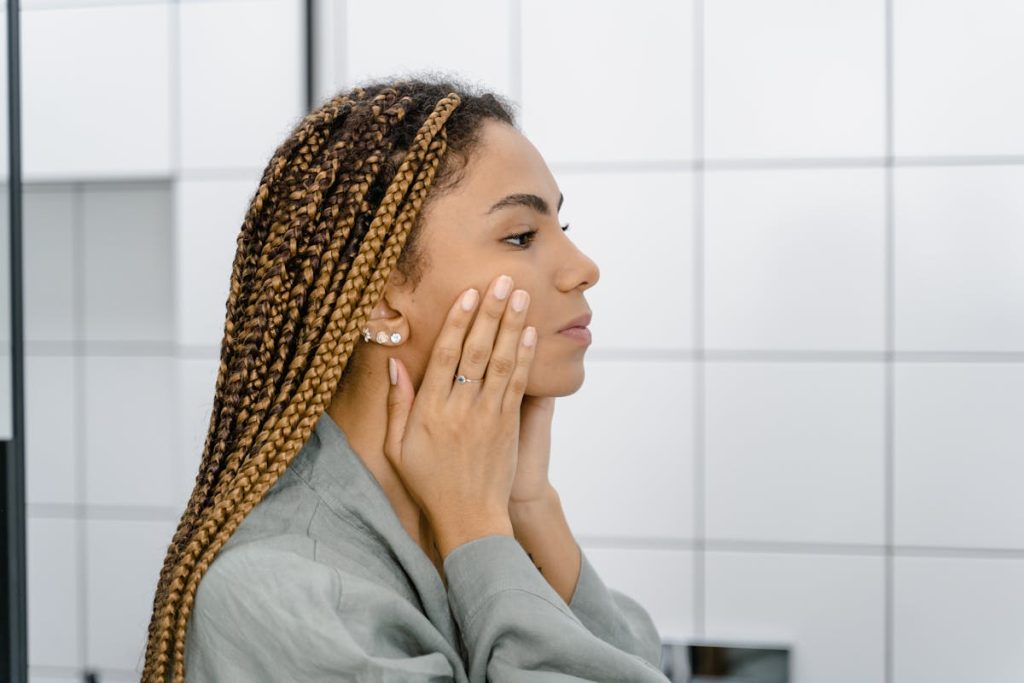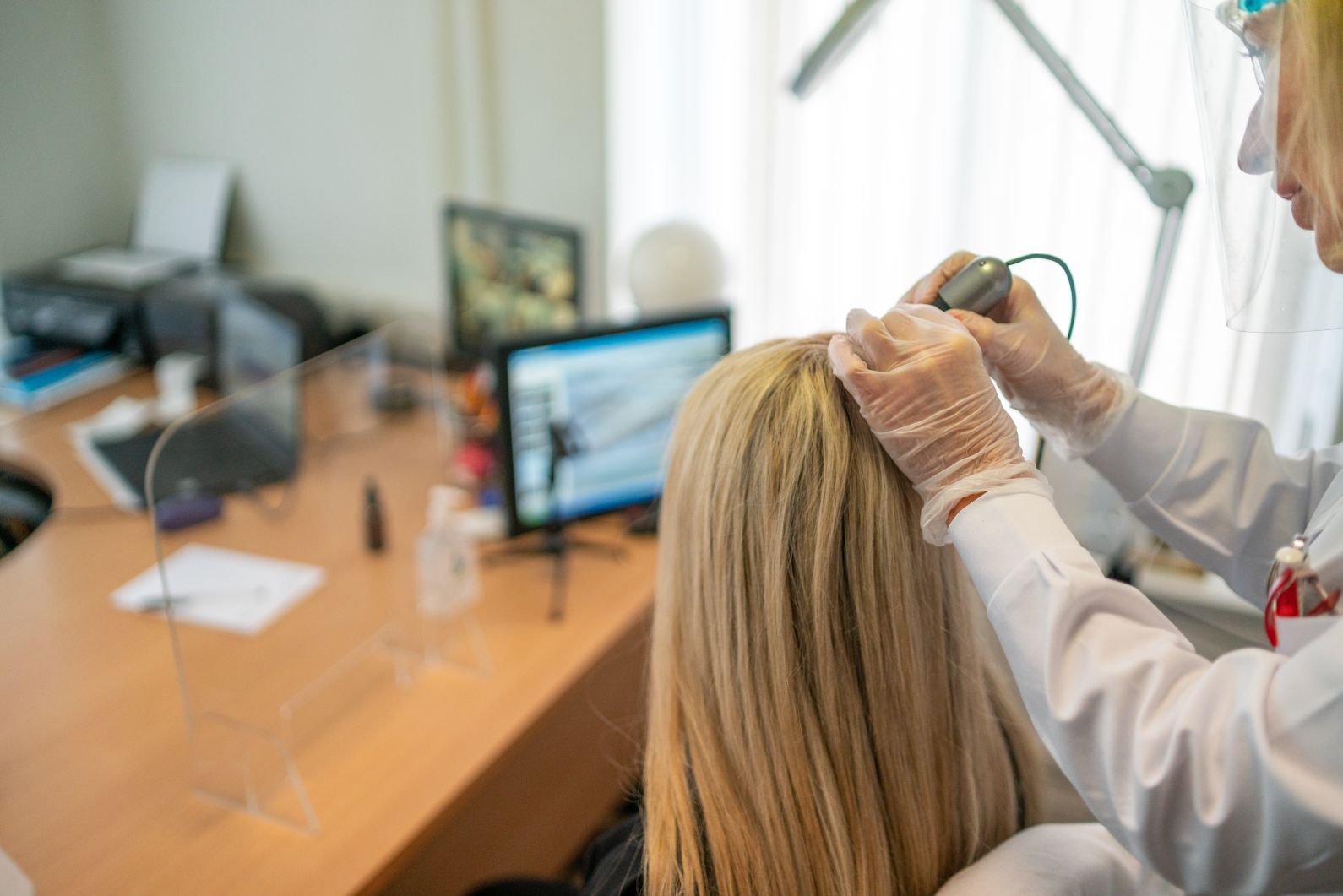It’s not widely recognised, but many women deal with hair loss. This often hidden struggle can be physically and emotionally taxing, most notably when triggered by stress—something many of us understand all too well.
Female hair loss from stress, also known in medical circles as telogen effluvium, can leave women feeling alone, confused, and desperate for solutions. However, it’s vital to establish that if you’re experiencing this, you are far from alone.
Understanding Female Hair Loss from Stress
It is no secret that stress can have a profound impact on people’s bodies. When under prolonged stress, the body releases hormones like cortisol, which can disrupt the normal hair growth cycle. Such stress can emerge from various sources: emotional turmoil, physical trauma, severe illness, or even significant life changes.
In case you didn’t know, the hair growth cycle has three distinct phases: anagen (growth), catagen (transition), and telogen (rest). Under stress, more hairs are prematurely pushed from the growth phase to the rest phase, culminating in excessive shedding and hair thinning a few months later.
It’s a biological alarm system of sorts, reflecting the various pressures people experience. This reaction is the body’s way of reallocating its resources to more ‘critical’ functions as a part of the survival response.

Stress-Induced Hair Loss in Women: Symptoms and Diagnosis
Spotting the signs of stress-induced hair loss early can make all the difference in managing the condition. Typically, women might notice excessive hair shedding and overall thinning rather than bald patches. Furthermore, this gradual change is diffused instead of localised, making it harder to notice at first.
Often, this type of hair loss will correct itself once stressors are reduced or eliminated. However, professional advice from a trichologist or dermatologist can confirm the suspicion and rule out other causes.
Diagnosis is typically based on medical history and perhaps a physical examination. In some cases, a blood test might be recommended to check for nutritional deficiencies or hormonal imbalances. The good news is that if stress is the primary culprit, plenty can be done to reverse its effect.
What Are the Treatments for Female Hair Loss From Stress?
Addressing telogen effluvium in women hinges on both seeking professional hair loss treatments where appropriate and managing stressors. Medical interventions in Dublin may include topical treatments designed to promote hair growth. In severe cases, laser hair growth therapy and platelet-rich plasma (PRP) therapy may be necessary. Laser hair growth therapy uses therapeutic low-level lasers to stimulate hair follicles and improve hair density. Meanwhile, PRP involves injecting growth factors from a patient’s blood into the scalp to encourage hair regrowth.
Alongside medical interventions, supplements like biotin, zinc, and iron may be included in the treatment plan. These can equip hair follicles with essential nutrients, fostering a more conducive environment for healthy hair growth. Additionally, the use of specialised hair care products may be recommended. Products such as shampoos, conditioners, and serums created for thinning hair are typically formulated with active ingredients that help strengthen hair and improve scalp health.
Adopting a stress-reduction lifestyle is equally vital for this type of hair loss. Mindfulness practices, regular exercise, and a balanced diet not only mitigate the effects of stress but also enhance overall health. Meditation and yoga, in particular, can provide profound calming effects, lowering stress levels and allowing the body to focus on healing and hair regeneration.

How Can Women Prevent Hair Loss Due to Stress?
As they say, prevention is often better than cure. When it comes to stress-induced hair loss, this saying holds true. Here are tips to safeguard your hair health:
Prioritise Self-Care
Dedicate time for activities that relax and rejuvenate your spirit. Whether it’s engaging in a hobby, immersing yourself in nature, or socialising, find what helps you unwind.
Recognise Stress Signals
Learn to identify early signs of stress for timely management and intervention. These signals can vary widely among individuals, but some common symptoms include irritability, changes in sleeping patterns, difficulty concentrating, and physical manifestations such as headaches, muscle tension, or stomach problems.
Manage Stress Effectively
Cultivate healthy coping mechanisms to navigate stress. As mentioned earlier, techniques such as mindfulness, journaling, or reaching out to your support network can be particularly beneficial.
Maintain a Balanced Diet
Nutrition plays a pivotal role in hair health. Ensure your diet includes a mix of antioxidants, omega-3 fatty acids, proteins, and essential vitamins to nourish your hair from the inside out.
Get Enough Sleep
Never underestimate the power of rest. Adequate sleep supports both your mental and physical health, directly influencing hair strength and growth.
Limit Hair Styling Damage
Be mindful of hair styling practices that could compromise hair integrity. Avoid excessive heat, harsh chemicals, and tight styles that could lead to hair damage and loss.
Integrating these practices into your daily routine not only minimises the chance of stress-related hair loss but also fosters a healthier, more contented lifestyle. But it is also crucial to keep in mind the importance of consulting a professional hair loss specialist if you’re experiencing significant hair loss.
Seeking guidance from a trusted trichologist in Dublin is not just a step towards confirming the cause of hair loss. It’s a crucial part of preventing the condition from worsening. Professionals can offer tailored advice and treatment options that align with your unique health needs.
How to Cope With Stress-Related Female Hair Loss
Losing hair can be emotionally challenging. But it’s important to remember that you’re not alone. Many women experience hair loss at some point in their lives. Furthermore, there are steps you can take to effectively cope with it. Here are some strategies:
Acknowledge Your Feelings: Recognise and accept the emotional impact of hair loss. It’s okay to feel frustrated or upset.
Combat Negative Self-Talk: Remember that your value isn’t tied to your appearance or hair. Focus on your strengths and attributes that make you feel proud.
Practise Self-Compassion: Be kind to yourself during this challenging time. Engage in activities that boost your self-esteem and contribute to a positive self-image.
Embrace Body Positivity: Work towards accepting changes in your appearance.Recognise that beauty is diverse and not defined by hair alone.
Seek Community Support: Connect with friends and family for emotional support.Join support groups, either in-person or online, to share experiences and coping strategies with others facing similar challenges.
Utilising these strategies can help manage the psychological impact of hair loss, creating a foundation for resilience and positivity.
In conclusion, female hair loss from stress can be a distressing experience. But it’s important to remember that it’s often temporary. By understanding the causes, seeking professional help, and adopting healthy lifestyle habits, you can manage and prevent this condition.
Keep in mind that taking proactive and informed steps towards managing stress-related hair loss can lead to not only a fuller head of hair but also a more empowered and resilient self.
Do you suspect that you are experiencing female hair loss from stress and unsure what to do next? Book a consultation at our hair clinic to get tailored advice and effective treatment options from our trusted trichologist. Call us now on +353 (0)1 679 3618 or send us a message here.
Royalty-free image supplied from Pexels as part of the SEO service from 3R



